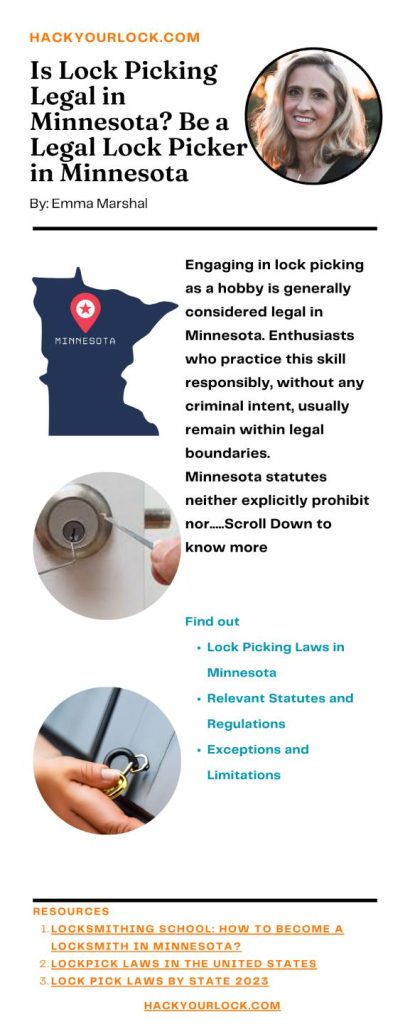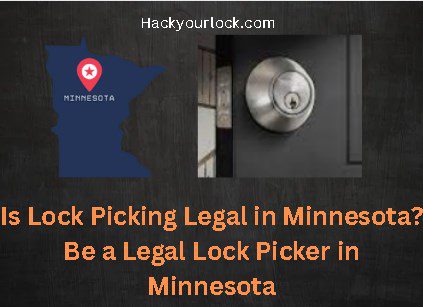In the Land of 10,000 Lakes, the lock picking enthusiasts often ask: Is lock picking legal in Minnesota?
Understanding the legalities surrounding this age-old skill is paramount for enthusiasts and locksmiths alike.
In this comprehensive guide, we figure out the intricacies of lock picking in Minnesota, shedding light on its legality, exceptions, and potential penalties.

Contents
Is Lock Picking Legal in Minnesota?

Engaging in lock picking as a hobby is generally considered legal in Minnesota. Enthusiasts who practice this skill responsibly, without any criminal intent, usually remain within legal boundaries.
Minnesota statutes neither explicitly prohibit nor permit lock picking. However, the state’s laws on burglary and trespassing make it essential to discern the fine line between a harmless skill and a potential criminal act.
Answer to “Is Lock Picking Legal in Minnesota?” according to Lockpick Laws In the United States is a YES with a must show intent.
Lock Picking Laws in Minnesota

Lock picking laws in Minnesota revolve around the question, “Is lock picking legal in Minnesota?” Lock picking laws in Minnesota are governed by specific statutes designed to regulate the possession and use of lock-picking tools.
Minnesota, like many states, has specific statutes governing the act of lock picking. It is crucial to recognize that the legality is contingent upon the intent behind this skill.
The state’s laws generally differentiate between lawful activities, such as locksmithing or personal property retrieval, and unlawful activities, such as burglary or theft.
Relevant Statutes and Regulations
Here is the information about relevant statutes and regulations regarding lock picking laws in Minnesota presented in a table format:
| Statute/Regulation | Description |
| Minnesota Statute 609.59 | This statute outlines the general principles regarding burglary and trespassing, emphasizing that engaging in lock picking with criminal intent is strictly prohibited. |
| Minnesota Statute 624.714 | Governs the possession and use of dangerous weapons, including lock picking tools. Individuals found with these tools under circumstances indicating criminal intent may face penalties. |
| Minnesota Statute 325E.37 | Pertains to locksmithing regulations, requiring individuals to obtain proper licensing before engaging in professional lock picking activities. |
| Minnesota Statute 609.52 | Defines theft-related offenses, including burglary tools, and establishes penalties for individuals using lock picking tools for unlawful activities. |
| Minnesota Statute 609.605 | Addresses criminal trespass, distinguishing between innocent property retrieval and the use of lock picking tools for unauthorized entry. |
Is lock picking legal in Minnesota should become more clear from conditions of legality and illegality.
Conditions under Which Lock Picking is Considered Legal or Illegal in Minnesota
| Conditions | Legal Lock Picking | Illegal Lock Picking |
| Licensed Locksmiths | Lock picking activities performed by individuals with proper licensing and accreditation, such as licensed locksmiths operating within the ethical boundaries of their profession. | Unauthorized individuals attempting to pick locks without the requisite licensing or accreditation, engaging in locksmithing activities without adhering to ethical and legal standards. |
| Homeowners on Their Property | Homeowners using lock picking tools to regain access to their own properties due to situations like misplaced keys or malfunctioning locks. | Individuals attempting to pick locks on properties without legal authorization or ownership, indicating criminal intent such as trespassing or burglary. |
| Lawful Intent for Property Retrieval | Lock picking employed with the intention of retrieving personal belongings or assisting others in gaining access to their property in a legal and ethical manner. | Lock picking tools used with the intent to commit a crime, including breaking and entering, burglary, or theft. The act of lock picking becomes illegal when associated with criminal activities. |
| Criminal Intent and Unlawful Activities | Absence of criminal intent; lock picking tools utilized for legal purposes, with no connection to unlawful activities. | Use of lock picking tools as a means to facilitate criminal activities, such as breaking into homes, businesses, or vehicles. The act becomes illegal when associated with trespassing, burglary, or theft. |
There is a comprehensive article on Is lock picking illegal in the US for detailed information on all states in this regard.
Following table summarizes the key points from Minnesota Statutes 2006 – § 609.59, in Lockpick Laws In the United States.
Exceptions and Limitations
In Minnesota, lock picking is legally permitted for licensed locksmiths, law enforcement personnel, and individuals with explicit property owner consent.
Homeowners and Lock Picking
Homeowners in Minnesota have the right to pick locks on their own properties, emphasizing the importance of responsible lock usage.
This legality extends to instances where individuals may need to regain access to their homes due to misplaced keys or malfunctioning locks.
Licensed Professionals
Licensed locksmiths play a pivotal role in Minnesota’s security landscape. Their expertise in lock picking is not only legal but also vital for assisting individuals who find themselves locked out of their homes or vehicles. To practice this skill within the bounds of the law, locksmiths must obtain the necessary licensing, ensuring they adhere to ethical standards.
Licensing Requirements of Locksmiths in Minnesota
For those considering a career in locksmithing, Minnesota Statute 325E.37 underscores the importance of obtaining the necessary licensing.
Locksmiths must adhere to ethical standards and operate within the confines of the law, contributing to the overall security landscape of the state.
Embarking on the journey to become a locksmith in Minnesota doesn’t follow a strict set of rules, but certain keys open doors according to Locksmithing School: How to Become a Locksmith in Minnesota?
| Eligibility Criteria | |
| Age | 18 years or older |
| Education Degree | None required |
| Criminal History | Good moral background; a criminal record is not an automatic disqualification |
| Key Skills | Mechanical and mathematical abilities, knowledge of lock components, proficiency in using locksmith tools |
| License and Certification | State-issued business license or City Hall business license; Professional certifications recommended |
| Average Salary (US, as of August 2022) | $50,000 – $60,000 per year |
| Steps to Become a Locksmith in Minnesota |
| 1. Get locksmith training (join a trade school) |
| 2. Work as an apprentice locksmith to gain experience |
| 3. Obtain locksmith certifications (optional) |
| 4. Find employment with local locksmith companies or start your own business |
| 5. Join a reputable trade association for industry knowledge and support |
| 6. Continuously upgrade skills and stay informed about the latest lock and security technology |
Penalties for Illegal Lock Picking
Individuals caught engaging in unlawful lock picking in Minnesota face severe legal consequences.
Penalties may include fines, imprisonment, or both, depending on the circumstances and the intent behind the act.
It is crucial to understand the gravity of the situation and the potential repercussions associated with criminal lock picking.
Do you want to know about similar aspects related to lock picking in other states as well? Other states like California, Arizona, Alaska, Alabama, Ohio, New York, Washington, Florida, Virginia, Colorado, Connecticut, Delaware , Georgia, Hawaii, Iowa, Idaho, Kansas, Kentucky, Louisiana, Massachusetts, Maryland, Maine etc. have also similar regulations.
Conclusion
In addressing the question “Is lock picking legal in Minnesota?” it’s important to note that the legality of lock picking hinges on the intent and application of the skill.
While merely possessing lock-picking tools is generally legal, using them with malicious intent, such as unauthorized entry, is a criminal offense. This distinction is crucial for locksmiths, students, and locksport enthusiasts to comprehend.
Adhering to ethical practices and respecting legal boundaries is paramount.
Therefore, individuals engaging in lock picking in Minnesota, whether for educational purposes or locksport, must be mindful of the legal implications, ensuring their activities align with ethical standards and comply with the law.
Always prioritize responsible and lawful use of lock-picking skills to navigate the intricate legal landscape surrounding this practice.
FAQ’s
- Is Lock Picking Legal in Minnesota?
In Minnesota, possessing lock-picking tools is generally legal, but the legality is contingent on the intent behind their use. Engaging in unauthorized entry or any unlawful activity using these tools is strictly prohibited and considered a criminal offense.
- Do I Need Certification to Become a Locksmith in Minnesota?
While there is no mandatory certification for locksmiths in Minnesota, obtaining professional certifications is highly recommended for showcasing qualifications and enhancing credibility in the field. However, securing a state-issued business license or one from City Hall is a requirement to operate legally.
- What Skills Are Essential for a Career in Locksmithing?
Key skills for locksmiths include mechanical and mathematical abilities, knowledge of lock components, and proficiency in using locksmith tools. Additionally, having a good moral background is essential, and continuous learning about the latest advancements in lock and security technology is encouraged for staying competitive in the industry.
